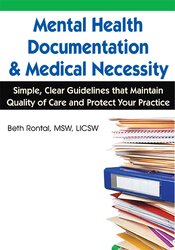Meeting Deadlines for Progress Notes in Mental Health

One of the most common questions I receive in my documentation course is, "What's the deadline for completing progress notes?" It can be a bit frustrating because, much like many aspects of mental health, there isn't a definitive answer. The resulting confusion can contribute to “Documentation Anxiety,” which therapists would love to live without.
Although insurance companies stress the importance of “timely submissions,” the enforcement of these guidelines can vary. For instance, Medicare and Medicaid stipulate that notes should be completed within 24 to 48 hours, but strict enforcement is not always the case. It's no wonder there is confusion surrounding progress note deadlines.
Another effective method is concurrent documentation, where notes are recorded during the session. This approach allows you to capture critical information promptly, reducing the chances of a backlog of unfinished notes. Additionally, it involves the client in the documentation process, which, according to research sited in , can enhance the therapeutic outcome.
For a thorough explanation of what and how much to write in your progress notes, treatment plans and the other documentation essential for clinical practice, check out my şÚÁĎÍř course, and the Documentation Wizardâ„ Clinical Forms.
Plus, you can download these free for quick completion recommendations from the Documentation Wizard.
Addressing the Confusion
Our professional codes of ethics, insurance companies, and state statutes underscore the significance of clinical documentation. And it’s always best to check the regs of each insurance company with which you’re empaneled and each state in which you may be licensed. But most of the time, none of them offer specific guidelines for progress note completion. Instead, they emphasize that documentation should be done "in a timely manner." Yes, this is a quote from our codes of ethics, many insurance companies and state regs!Although insurance companies stress the importance of “timely submissions,” the enforcement of these guidelines can vary. For instance, Medicare and Medicaid stipulate that notes should be completed within 24 to 48 hours, but strict enforcement is not always the case. It's no wonder there is confusion surrounding progress note deadlines.
Clinic Practices in Perspective
During my time as a supervisor at a mental health clinic, there was a requirement to submit our notes by noon on Mondays to allow for billing to be processed by 3 PM. This practice provided clinicians with a window of up to one week to complete their progress notes. The deadline applied to all our insurance companies, including Medicare and state-run Medicaid companies. Interestingly, even though we didn't strictly adhere to Medicare’s 24–48 hour guideline, we were never penalized for “late submission.” We passed all our audits.Best Practices to Follow
While there might not be a strict rule specifying the deadline for timely notes, there are recommended best practices. The best practice is to write your notes either immediately after the session or by the end of the workday. This approach ensures you have a fresh and accurate recollection of the session's details. This makes the note-writing process smoother, faster, more precise, and done. The next day is a fresh start.Another effective method is concurrent documentation, where notes are recorded during the session. This approach allows you to capture critical information promptly, reducing the chances of a backlog of unfinished notes. Additionally, it involves the client in the documentation process, which, according to research sited in , can enhance the therapeutic outcome.
Adhering to the Three-Day Rule
In cases where writing notes on the same day isn't practical, it's advisable not to let more than three days pass. Going beyond this three-day time frame can raise doubts about the accuracy of your memory, especially if your notes come under scrutiny during legal proceedings. It's important to remember that being questioned about your documentation is not a personal matter but rather a standard part of the legal process aimed at ensuring the reliability of recorded information. (But it will feel personal!) Writing your notes within the three-day window provides an added layer of protection.Write Your Note Before Billing It!
Without a written note, there is no way to prove a session was provided. Consequently, billing for a service without completing the note can give rise to allegations of fraud. So, writing your note before billing for the session serves a dual purpose: it fulfills the legal requirement for demonstrating that the service was provided, and it motivates timely completion.Embracing Compliance
In the realm of mental health documentation, there may not be a single, universally applicable answer to the timing of progress note completion, but there are certainly guidelines to follow. By embracing best practice recommendations, including writing notes immediately after a session, or by the end of the workday, or by adhering to the three-day rule, and tightly linking billing to note completion, you can ensure that you’re written your notes “in a timely manner.” Doing so will help avoid and reduce this aspect of documentation anxiety.For a thorough explanation of what and how much to write in your progress notes, treatment plans and the other documentation essential for clinical practice, check out my şÚÁĎÍř course, and the Documentation Wizardâ„ Clinical Forms.
Plus, you can download these free for quick completion recommendations from the Documentation Wizard.
Get Simple, Clear Guidelines that Maintain Quality of Care and Protect Your Practice

The success of your practice depends on your ability to write good intake summaries, treatment plans, session notes, case/collateral notes, and discharge summaries. Taken together, these pieces to the documentation puzzle support your goal of providing quality services to your clients. They also impact the stability and success of your practice. When done well, they result in piece of mind and timely payment from insurance companies. When done poorly, they lead to the misery of denials, audits, and lost income.
he great news is that you CAN become proficient at mental health documentation and medical necessity. This seminar provides clear and simple guidelines for recordkeeping that adheres to professional standards and ethical codes, supports delivery of quality care, and reduces errors and delays in payments.
he great news is that you CAN become proficient at mental health documentation and medical necessity. This seminar provides clear and simple guidelines for recordkeeping that adheres to professional standards and ethical codes, supports delivery of quality care, and reduces errors and delays in payments.
Meet the Expert:
Beth Rontal, MSW, LICSW, is affectionally known as the Documentation Wizard. For over 15 years, Beth has been instrumental in changing how individuals and organizations approach documentation. She teaches what and how much to write so that clinicians pass audits, protect client confidentiality, protect their income, and reduce their anxiety. Learn more about her work at .
Learn more about her educational products, including upcoming live seminars, by clicking here.
Learn more about her educational products, including upcoming live seminars, by clicking here.



